 Petzlover
Petzlover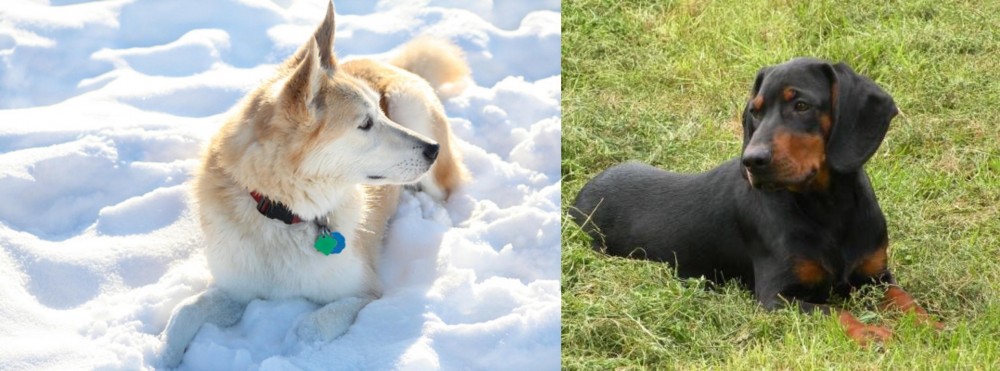 Labrador Husky is originated from Canada but Slovakian Hound is originated from Slovakia. Labrador Husky may grow 24 cm / 10 inches higher than Slovakian Hound. Labrador Husky may weigh 28 kg / 62 pounds more than Slovakian Hound. Both Labrador Husky and Slovakian Hound has almost same life span. Both Labrador Husky and Slovakian Hound has same litter size. Labrador Husky requires Moderate Maintenance. But Slovakian Hound requires Low Maintenance
Labrador Husky is originated from Canada but Slovakian Hound is originated from Slovakia. Labrador Husky may grow 24 cm / 10 inches higher than Slovakian Hound. Labrador Husky may weigh 28 kg / 62 pounds more than Slovakian Hound. Both Labrador Husky and Slovakian Hound has almost same life span. Both Labrador Husky and Slovakian Hound has same litter size. Labrador Husky requires Moderate Maintenance. But Slovakian Hound requires Low Maintenance
 The Labrador Husky is a purebred, spitz-type dog which looks much like a Wolf. People think because it has the name Labrador Husky it is a cross between a Husky and Labrador. What it essentially means is that it is a Husky dog which comes from the region of Labrador, Canada.
The Labrador Husky is a purebred, spitz-type dog which looks much like a Wolf. People think because it has the name Labrador Husky it is a cross between a Husky and Labrador. What it essentially means is that it is a Husky dog which comes from the region of Labrador, Canada.
It is a fairly unknown breed, but it is strongly believed that the dog was developed in Labrador, a region of northern Canada. In fact this is where the dog got its name from.
The attractive dog was used for sledding and it is also thought that the people of Labrador introduced Alaskan Malamute and German Shepherd in to add in some additional skills from these two dog breeds. The dogs were later domesticated so as to become companion animals.
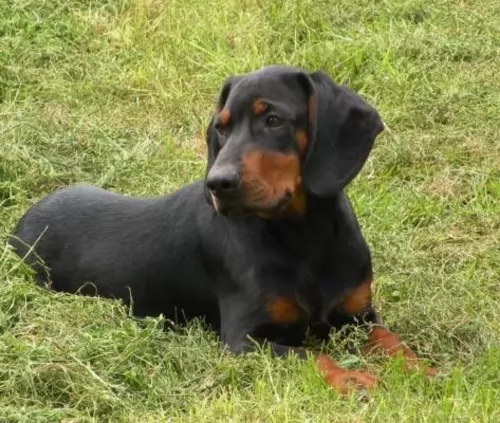 The Slovakian Hound is also known as the Slovenský Kopov or the Black Forest Hound. This is a scenthound which comes from Slovakia in Central Europe and has been bred for boar hunting.
The Slovakian Hound is also known as the Slovenský Kopov or the Black Forest Hound. This is a scenthound which comes from Slovakia in Central Europe and has been bred for boar hunting.
The breed was first recognized in the 1870s, with dogs such as the Austrian Black and Tan Hound as well as the Hungarian Greyhound being thought to be part of dogs ancestry. The breed club was established in 1988 and is recognized by the FCI.
 The wolf-like muscular Labrador Husky is a large dog standing at 51 to 71 cm in height and weighing 27 to 45 kg.
The wolf-like muscular Labrador Husky is a large dog standing at 51 to 71 cm in height and weighing 27 to 45 kg.
Labrador is a place known for its icy winters and the dog’s double coat protects it from the freezing temperatures.
The color of the coat can be white, grey and white, solid black, solid grey as well as red and white. In fact there can be several different coat colors in one litter.
He has a long muzzle like the wolf and blue or brown slanted eyes. Sometimes you’ll get one blue eye and one brown eye. He has pointed ears, a nose which can be black or a pinkish color, bushy tail and paws which are webbed.
Labrador Huskies make wonderful pets and they are good with children, particularly when they’ve been properly trained and socialized.
Because they are dogs which have worked in a pack, they also get on well with other dogs in the home. You’ll notice that your Labrador Husky won’t often bark but he will howl like a wolf.
He is a friendly dog and not aggressive. He is intelligent too and you can teach him some basic commands such as sit, stay and lie-down.
The Labrador Husky is a dog used to having a job so if you bring him into your home, you’ll need to ensure that you set aside time to exercise him as he will become frustrated and bored if he isn’t involved in your family life.
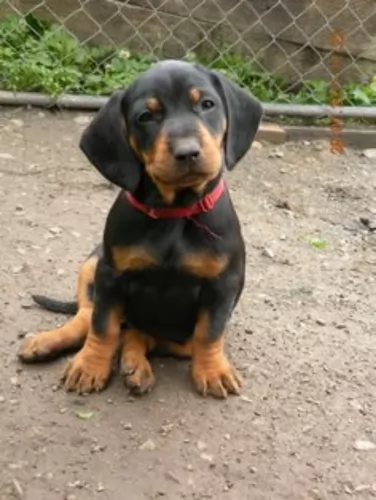 The Slovakian Hound is a muscular dog of medium height and with a long tail and long drop ears. The short coat is always black with tan markings.
The Slovakian Hound is a muscular dog of medium height and with a long tail and long drop ears. The short coat is always black with tan markings.
These compact looking dogs stand in height at about 43 to 47cm and weigh in the region of 14 to 17kg. The face is friendly and the eyes alert and bright.
Independent and intelligent, the Solvakian Hound will learn some basic commands easily. He is adaptable and will fit into life in the countryside as well as the city, so long as he is well exercised.
He is a sociable, playful dog and will do well with children, particularly if he has been trained and socialized. He is also a good choice for the first-time dog owner. He is alert and makes a good watchdog too.
 A Labrador Husky is a loyal, affectionate dog who is capable of forming a strong bond with his human family.
A Labrador Husky is a loyal, affectionate dog who is capable of forming a strong bond with his human family.
As a working dog, he loves being busy with fun and games and is playful and energetic and has good looks on his side too.
He is also an intelligent dog, strong-willed and confident and will require a firm, consistent owner who understands his need for regular exercise.
Social, lively and robust, the right environment will bring out all this beautiful dog’s best characteristics.
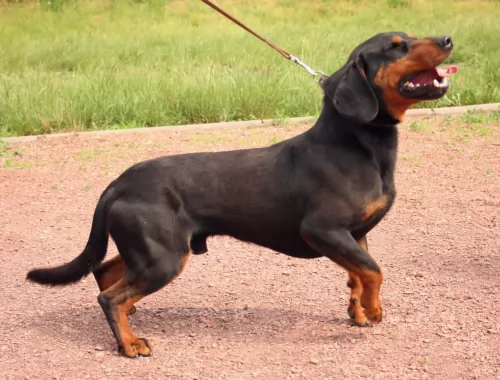 His job as a hunting dog has meant that the Slovakian Hound is a brave, energetic, determined dog.
His job as a hunting dog has meant that the Slovakian Hound is a brave, energetic, determined dog.
As a pet and companion, you won’t be disappointed as he puts as much effort into his relationships with his human family as he does with hunting.
This amicable dog makes a wonderfully loyal and devoted pet, companion and guard dog.
 Labrador Huskies can live to be between 10 and 13 years of age, and within a loving home he is generally looked upon as a healthy breed.
Labrador Huskies can live to be between 10 and 13 years of age, and within a loving home he is generally looked upon as a healthy breed.
There are always typical dog problems that might be found in your dog, and a couple of the more prominent ones are listed -
It can be a sad day for your Labrador Husky if he is diagnosed with hip dysplasia because if he is still used as a pack dog for pulling sleds it could well put him out of a job that he thrives on. It is a problem in the hips, and your once active dog may be in pain and may even battle to stand up after lying down.
He could even develop arthritis which can cripple him. He’ll need to get to the vet so that treatment can make life comfortable for him and to assist with pain.
Deep chested dogs are more prone to bloat, and your Labrador Husky is a deep chested dog. The stomach of the dog expands with gas, blocking gas escaping and putting pressure on the abdominal organs of the dog.
In some cases the stomach can twist and then immediate surgery will be required. This is a life threatening illness. Try and avoid feeding your dog one large meal and feed him smaller meals instead. These days you also get feeding bowls that encourage slower eating.
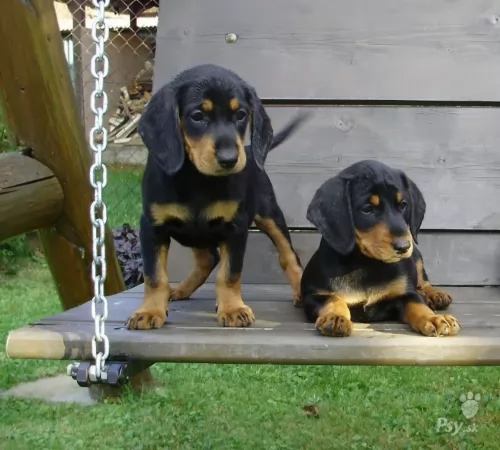 Most dogs at some or other time will be faced with a particular health challenge. Most times the veterinarian can fix these problems with the right kind of treatment.
Most dogs at some or other time will be faced with a particular health challenge. Most times the veterinarian can fix these problems with the right kind of treatment.
The Slovakian Hound is a healthy dog breed and you aren’t likely to come up with too many problems, though it it wise to be aware of some of the more common dog illnesses there are -
This is something you can expect as your Slovakian Hound ages. It is brought on by tissue degeneration. With eyes, dogs can develop cataracts. With his ears, consistently cleaning and watching out for ear infections can also help with slowing down hearing loss.
Apart from hip dysplasia which can start with even very young dogs, osteoarthritis can cause joint pain and stiffness of joints. It’s a degenerative disease, but fortunately there are a number of treatments to alleviate pain. Remember that nutrition plays a huge role in reducing joint problems in dogs.
Cancer is also a disease that has no respect for the age of the dog or dog breed. When you brush your pet, feel for any unusual lumps. Not all lumps are cancerous but it will be a good idea to have your pet checked over by the vet.
 You’ll want to introduce a proper grooming routine for your pet as he has a thick double coat and he sheds throughout the year. Brush the thick coat 2 or 3 times a week, and set aside time to check for fleas and ticks and any appearance of lumps.
You’ll want to introduce a proper grooming routine for your pet as he has a thick double coat and he sheds throughout the year. Brush the thick coat 2 or 3 times a week, and set aside time to check for fleas and ticks and any appearance of lumps.
These are dogs which require a lot of vigorous exercise. Left chained or ignored he can become frustrated, run-down, bored and sick. He is a living, social animal that should only be brought into a household that acts responsibly towards him.
Choose high quality food which is for high energy dogs. If you give him dry kibble, mix in some home-made food occasionally to add variety, and also try to include some raw meat from time to time. Always ensure fresh, cool water is available.
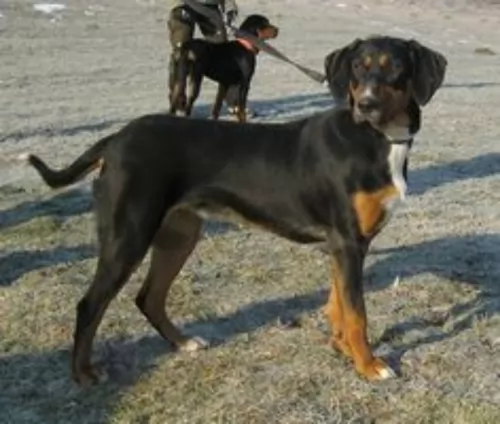 ● Like every other dog, the Slovakian Hound will need exercise if he is to remain healthy and fit. There are lots of back-yard games for dogs such as hide and seek and ball and rope games. He will also love a daily walk.
● Like every other dog, the Slovakian Hound will need exercise if he is to remain healthy and fit. There are lots of back-yard games for dogs such as hide and seek and ball and rope games. He will also love a daily walk.
● Always provide your dog with the best food there is as this encourages good health. Your Slovakian Hound requires top quality food, and while there are some good commercially manufactured foods on the market, it is important to choose the high quality ones that have natural, good ingredients in them.
Try to include some home-made food for him which can be simply mixed into the dry kibble twice a week. Boiled chicken, brown rice or pasta and spinach, sweet potatoes and carrots is super tasty and nutritious. Also try to include some raw meat into the diet occasionally as this helps with preventing skin diseases.
● Trim your Slovakian Hound's nails and check his eyes and ears for infection. The inside of the ears shouldn’t be red and the eyes should be clear and bright. If he will allow you to, check inside his mouth too to make sure there are no bad teeth.
● Don’t allow your dog to have puppies. There are so many unwanted puppies all over the world. Rather have him or her spayed or neutered to avoid puppies that nobody wants. It is beneficial for his health too.